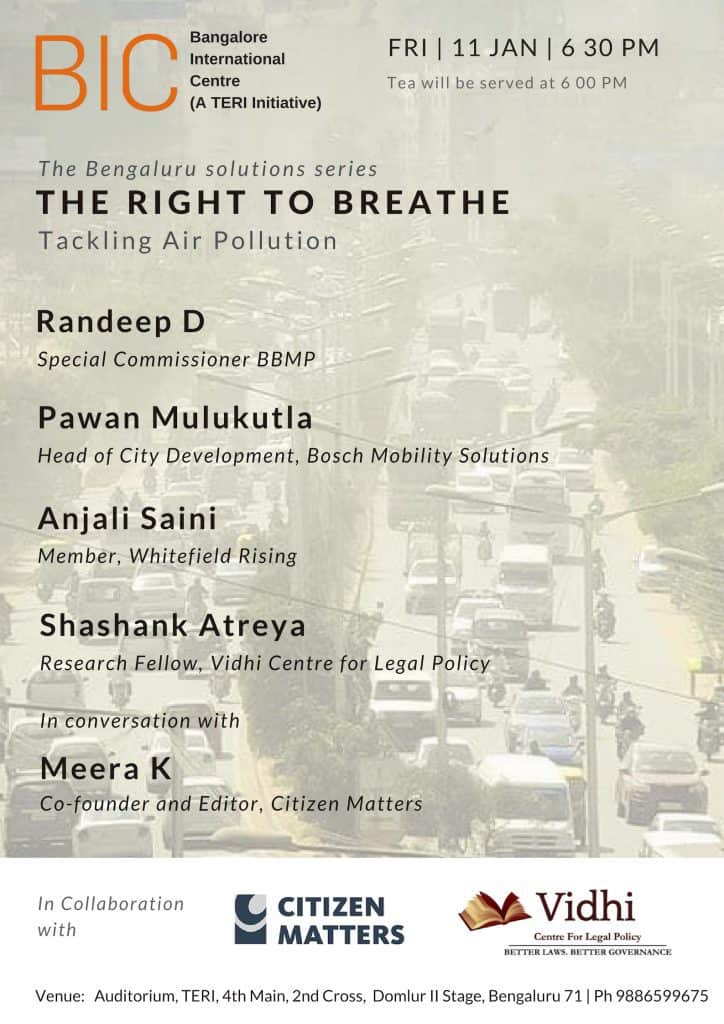From vehicular emissions to garbage burning, to dust on the streets and industrial smoke, there are many facets to air pollution in Bengaluru. Karnataka government allocated Rs 96 crores in last budget to monitor air pollution across the state in its budget for the first time in 2018, but the progress of work remains unknown.
This winter season where the temperature has dipped up to 6 degrees in some areas, has shown that the quality of city’s air is declining and much needs to be done to improve it. A recent report published by Climate Trends has shown Bengaluru to be most impacted by vehicular pollution in the country. The report also recognises the need for better governance and regulations to combat air pollution in the City.
Bengaluru Solutions Series is a public engagement series organised through a collaboration between Citizen Matters, Vidhi Centre for Legal Policy and Bangalore International Centre, that curates a series of articles and panel discussions aimed at discussing solutions on the issues the city is facing. The next panel discussion is on Januray 11, 2019, on The Right to Breathe- Fixing Bengaluru’s Air at Bangalore International Centre, Domlur.
This discussion is an attempt to shed light on the problem and identify solutions on the growing concern surrounding the quality of Bengaluru’s Air. The panel will haveRandeep D, IAS, Special Commissioner BBMP, Pawan Mulukutla, Head of City Development Bosch Mobility Solutions, Anjali Saini, Member of Whitefield Rising and Shashank Atreya, Research Fellow at Vidhi Centre for Legal Policy, in conversation with Meera K, Trustee, Oorvani Foundation.
Randeep D is a member of the Indian Administrative Service, currently posted as Special Commissioner – solid Waste Management, BBMP. He handles solid waste management and public health issues as part of his current assignment. In the past he has undertaken critical roles in the field of urban governance, as Deputy Commissioner Mysore and Bijapur.
Pawan Mulukutla has over 17 years of experience in Urban mobility field and has worked with several cities in addressing the issues of congestion, traffic management, air-quality, road safety and land use. His role involves actively partnering with cities and mobility start-ups towards integration of public-private transportation and adoption of shared, electric and connected solutions. Pawan holds Advanced Management Program from IIM-B, a Master’s degree in Transportation Engineering and Planning from Clemson University, USA and Bachelor’s degree in Civil Engineering from National Institute of Technology (NIT), Bhopal, India.
Anjali Saini is the CFO of a software company, previously with American Express Financial Advisors as financial advisor. She has been a part of Whitefield Rising for the past four years, pursuing various civic issues. She believes in and works towards promoting local governance model with ward committees and is a part of the Million Voter Rising movement.
Shashank Atreya is a resident fellow at Vidhi Centre for Legal Policy, and works with Citizen Matters on planning and organising Bengaluru Solutions Series. He is passionate about law and public policy.
More coverage on Air pollution – http://citizenmatters.in/air-quality-in-our-cities
In 2017, Vidhi published Cleaning Delhi’s Air: Implementation Action Plan, that identified legal and executive pathways to implement already identified solutions to improve Delhi’s air quality. This year, Vidhi Delhi has created a database, ‘Biting the Dust’, to track the monitoring and enforcement action taken by public authorities to track air pollution in the Delhi NCR.
